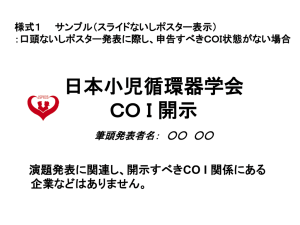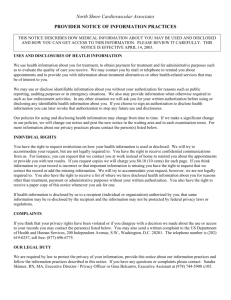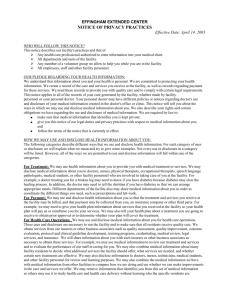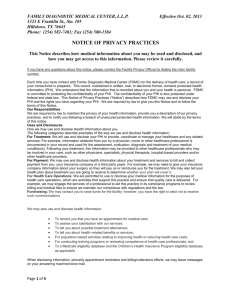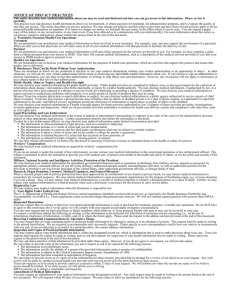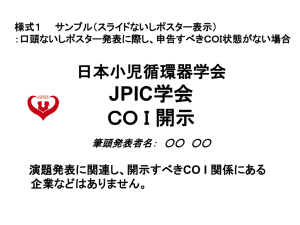Word File - Cascade Surgical Oncology
advertisement
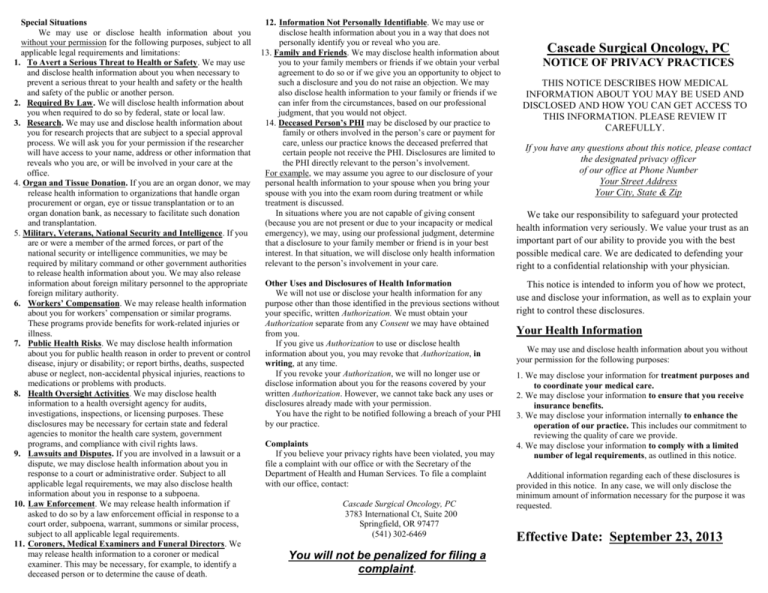
Special Situations We may use or disclose health information about you without your permission for the following purposes, subject to all applicable legal requirements and limitations: 1. To Avert a Serious Threat to Health or Safety. We may use and disclose health information about you when necessary to prevent a serious threat to your health and safety or the health and safety of the public or another person. 2. Required By Law. We will disclose health information about you when required to do so by federal, state or local law. 3. Research. We may use and disclose health information about you for research projects that are subject to a special approval process. We will ask you for your permission if the researcher will have access to your name, address or other information that reveals who you are, or will be involved in your care at the office. 4. Organ and Tissue Donation. If you are an organ donor, we may release health information to organizations that handle organ procurement or organ, eye or tissue transplantation or to an organ donation bank, as necessary to facilitate such donation and transplantation. 5. Military, Veterans, National Security and Intelligence. If you are or were a member of the armed forces, or part of the national security or intelligence communities, we may be required by military command or other government authorities to release health information about you. We may also release information about foreign military personnel to the appropriate foreign military authority. 6. Workers’ Compensation. We may release health information about you for workers’ compensation or similar programs. These programs provide benefits for work-related injuries or illness. 7. Public Health Risks. We may disclose health information about you for public health reason in order to prevent or control disease, injury or disability; or report births, deaths, suspected abuse or neglect, non-accidental physical injuries, reactions to medications or problems with products. 8. Health Oversight Activities. We may disclose health information to a health oversight agency for audits, investigations, inspections, or licensing purposes. These disclosures may be necessary for certain state and federal agencies to monitor the health care system, government programs, and compliance with civil rights laws. 9. Lawsuits and Disputes. If you are involved in a lawsuit or a dispute, we may disclose health information about you in response to a court or administrative order. Subject to all applicable legal requirements, we may also disclose health information about you in response to a subpoena. 10. Law Enforcement. We may release health information if asked to do so by a law enforcement official in response to a court order, subpoena, warrant, summons or similar process, subject to all applicable legal requirements. 11. Coroners, Medical Examiners and Funeral Directors. We may release health information to a coroner or medical examiner. This may be necessary, for example, to identify a deceased person or to determine the cause of death. 12. Information Not Personally Identifiable. We may use or disclose health information about you in a way that does not personally identify you or reveal who you are. 13. Family and Friends. We may disclose health information about you to your family members or friends if we obtain your verbal agreement to do so or if we give you an opportunity to object to such a disclosure and you do not raise an objection. We may also disclose health information to your family or friends if we can infer from the circumstances, based on our professional judgment, that you would not object. 14. Deceased Person’s PHI may be disclosed by our practice to family or others involved in the person’s care or payment for care, unless our practice knows the deceased preferred that certain people not receive the PHI. Disclosures are limited to the PHI directly relevant to the person’s involvement. For example, we may assume you agree to our disclosure of your personal health information to your spouse when you bring your spouse with you into the exam room during treatment or while treatment is discussed. In situations where you are not capable of giving consent (because you are not present or due to your incapacity or medical emergency), we may, using our professional judgment, determine that a disclosure to your family member or friend is in your best interest. In that situation, we will disclose only health information relevant to the person’s involvement in your care. Other Uses and Disclosures of Health Information We will not use or disclose your health information for any purpose other than those identified in the previous sections without your specific, written Authorization. We must obtain your Authorization separate from any Consent we may have obtained from you. If you give us Authorization to use or disclose health information about you, you may revoke that Authorization, in writing, at any time. If you revoke your Authorization, we will no longer use or disclose information about you for the reasons covered by your written Authorization. However, we cannot take back any uses or disclosures already made with your permission. You have the right to be notified following a breach of your PHI by our practice. Complaints If you believe your privacy rights have been violated, you may file a complaint with our office or with the Secretary of the Department of Health and Human Services. To file a complaint with our office, contact: Cascade Surgical Oncology, PC 3783 International Ct, Suite 200 Springfield, OR 97477 (541) 302-6469 You will not be penalized for filing a complaint. Cascade Surgical Oncology, PC NOTICE OF PRIVACY PRACTICES THIS NOTICE DESCRIBES HOW MEDICAL INFORMATION ABOUT YOU MAY BE USED AND DISCLOSED AND HOW YOU CAN GET ACCESS TO THIS INFORMATION. PLEASE REVIEW IT CAREFULLY. If you have any questions about this notice, please contact the designated privacy officer of our office at Phone Number Your Street Address Your City, State & Zip We take our responsibility to safeguard your protected health information very seriously. We value your trust as an important part of our ability to provide you with the best possible medical care. We are dedicated to defending your right to a confidential relationship with your physician. This notice is intended to inform you of how we protect, use and disclose your information, as well as to explain your right to control these disclosures. Your Health Information We may use and disclose health information about you without your permission for the following purposes: 1. We may disclose your information for treatment purposes and to coordinate your medical care. 2. We may disclose your information to ensure that you receive insurance benefits. 3. We may disclose your information internally to enhance the operation of our practice. This includes our commitment to reviewing the quality of care we provide. 4. We may disclose your information to comply with a limited number of legal requirements, as outlined in this notice. Additional information regarding each of these disclosures is provided in this notice. In any case, we will only disclose the minimum amount of information necessary for the purpose it was requested. Effective Date: September 23, 2013 Our Duties We are required by law to keep your information private. We must also provide you with this Notice and abide by its terms. We may need to revise our privacy practices from time to time. We expressly reserve the right to change the terms of our Notice of Privacy Practices and to make the new terms effective for all information covered by our Notice. If such changes occur, we will let you know about the new terms by providing a copy of the changes. Your Privacy Rights Please note that your are entitled to very specific rights regarding the use and disclosure of your information. We have listed your rights below: Right to Inspect and Copy You have the right to inspect and copy your health information, such as medical and billing records, that we use to make decisions about your care. You must submit a written request to our designated contact in order to inspect and/or copy your information. If you request a copy of your information, we may charge a fee for the costs of copying, mailing or other associated supplies. You may also choose to receive a copy of your health information in electronic form. We may deny your request to inspect and/or copy information in certain limited circumstances. If you are denied access to your health information, you can ask that the denial be reviewed. If the law requires such a review, we will select a licensed health care professional to review your request and our denial. The person conducting the review will not be the person who denied your request and we will comply with the outcome of the review. Right to Amend If you believe our records contain errors, you may make a written request that they be amended. We reserve the right to review your request and can decline to amend the record. We are required to place a copy of your proposed amendment in the record, even when we do not agree to amend the record itself. We may deny your request for an amendment if we did not create the information, unless the person or entity that created the information is no longer available to make the amendment. Right to Request Restrictions You have the right to request restrictions on the use and disclosure of your information. We are not required to agree to your request. If we do agree, we will comply to the best of our ability unless the information is needed to provide you with emergency treatment. To request restrictions, you may complete and submit the Request for Restriction on Use/Disclosure of Medical Information to our designated Privacy Officer/Contact. If your restriction invalidates your insurance coverage, we may require you to execute a waiver of insurance benefits and a payment agreement. Right to Request Confidential Communications You have the right to request that we communicate with you about medical matters in a certain way or at a certain location. For example, you can ask that we only contact you at work or by mail. To request confidential communications, you may complete and submit the form Request for Restriction on Use/Disclosure of Medical Information to our designated Privacy Officer/Contact. We will not ask you the reason for your request. We will accommodate all reasonable requests. Your request must specify how or where you wish to be contacted. Right to a Paper Copy of This Notice You have the right to a paper copy of this notice. You may ask us to give you a copy of this notice at any time. Even if you have agreed to receive it electronically, you are still entitled to a paper copy. To obtain such a copy, contact our designated Privacy Officer/Contact. Right to an Accounting of Disclosures You have the right to request an “accounting of disclosures.” This is a list of the disclosures we made of medical information about you for purposes other than treatment, payment and health care operations. To obtain this list, you must submit your request in writing to our designated Privacy Officer/Contact. It must state a time period, which may not be longer than six years and may not include dates before April 14, 2003. Your request should indicate in what format you want the list (for example, on paper or electronically). The first list you request within a 12-month period will be free. For additional lists, we may charge you for the costs of providing the list. We will notify you of the cost involved and you may choose to withdraw or modify your request at that time before any costs are incurred. Complaints and Investigations We have developed procedures for investigating any complaints or concerns you may have regarding our use and disclosure of your information or any other complaint you may have regarding our services. The law allows you to contact the Secretary of the Department of Health and Human Services with complaints about our use and disclosure of information. You may also contact our on-site Privacy Officer/Contact, who is dedicated to investigating complaints regarding the use and disclosure of information in our care. We will not, and legally cannot, retaliate against you for any complaint. Types of Use and Disclosure of Your Protected Health Information We may disclose your information for the following purposes without your consent: For Treatment Purposes We may disclose information needed for the provision, coordination or management of health care and related services, including the coordination between our office and a third party, such as a consultation between medical providers or a referral from our office to another provider. Personnel in our office may share information about you and disclose information to people who do not work in our office in order to coordinate your care, such as phoning prescriptions to your pharmacy, scheduling lab work and ordering X-rays. Family members and other health-care providers may be part of your medical care outside this office and may require information about you that we have. For Payment To obtain reimbursement from your insurer, we may be required to disclose your information. This may be necessary for determining your eligibility for coverage and adjudication of claims, billing, claims management and collections activities. We may also be required to disclose your information to your insurer for review of the medical necessity, coverage, appropriateness or justification of our charges. For example, we may need to give your health plan information about a service you received here so your health plan will pay us or reimburse you for the service. We may also tell your health plan about a treatment you are going to receive to obtain prior approval, or to determine whether your plan will cover the treatment. You have the right to restrict disclosures of your PHI to a health plan if you have paid out-of-pocket in full for the treatment. For Health Care Operations We may use and disclose health information about you in order to run the office and make sure that you and our other patients receive quality care. Healthcare operations may include: Quality assessment and improvement activities Reviewing the competence or qualifications of healthcare professionals or evaluating practitioner and provider performance Conducting training programs, accreditation, certification, licensing or credentialing activities Arranging for or conducting medical review, legal services or auditing functions, including fraud and abuse detection and compliance programs Managing and operating our practice, including activities such as customer service and complaint resolution Appointment Reminders We may contact you (via voicemail messages, postcards or letters) as a reminder that you have an appointment for your treatment or medical care at our office. Treatment Alternatives We may tell you about or recommend possible treatment options or alternatives that may be of interest to you. We also may tell you about health-related products or services that may be of interest to you. Marketing Health-Related Services We will not use your health information for marketing communications without your written, prior authorization. We will not sell your PHI to another organization for marketing or any other purposes.


